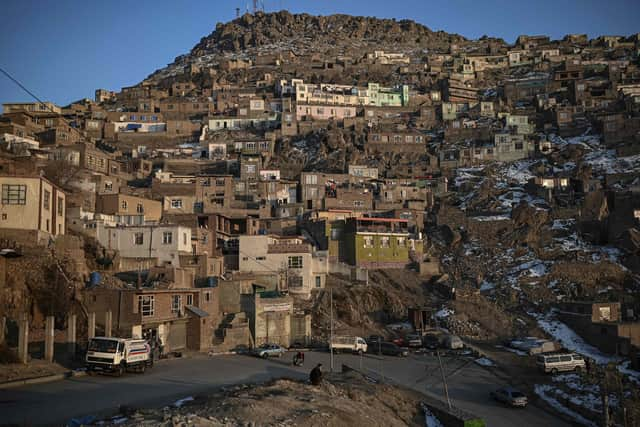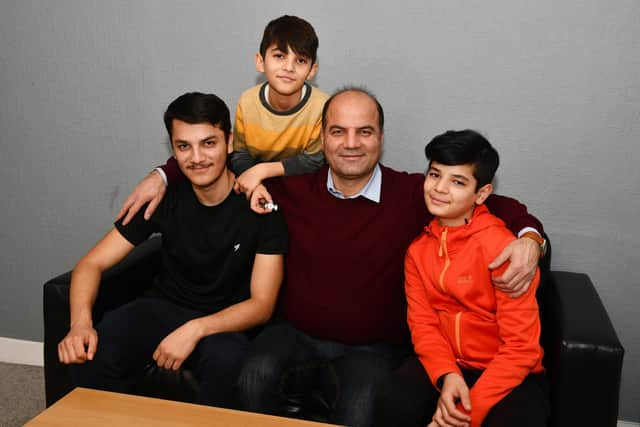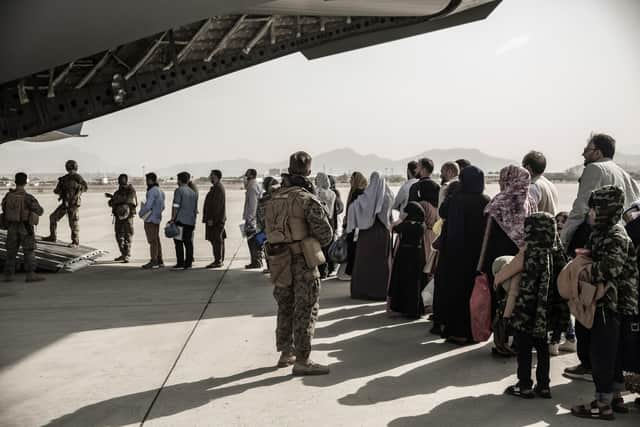‘I used to be a senior official in the Afghan government – now I am just a refugee’: Afghanistan chief opens up on relocating his family to Scotland
"We suddenly received a message from the Home Office saying ‘you are moving out tomorrow at nine o'clock, the buses will be there’,” he remembers.
Advertisement
Hide AdAdvertisement
Hide Ad"We didn't know what Scotland looked like. We didn't know what Perth looked like. Still, there are only two Afghan families in the whole of Perth.”


Chief executive of the Afghan Chamber of Commerce before the Taliban took control earlier this year, Mr Hashemi had also previously worked with British forces in a previous role advising a government minister on an oil and gas project in the country.
He was also a political advisor to the British ambassador, making him eligible for emergency resettlement in the UK amid fears over reprisals against British allies from the new regime.
In total, around 15,000 British nationals and Afghans associated with British forces were evacuated to the UK under Operation Pitting, which saw more than 100 flights leave Afghanistan in the largest British evacuation since the Second World War.
"I had to take the opportunity to evacuate my family,” he says.


Together with his wife Sima and three sons Ramin 17, Shahyae, 13 and Masih, 8, Mr Hashemi boarded a plane to Britain just two days before the fall of the Afghan government in August.
He says: "We lost everything in the country overnight. We lost the country. We lost the life we had for years and, of course, we have to leave the country.
"We have extended family back home. It's all about heart-breaking news that we are getting from Afghanistan every day.”


Advertisement
Hide AdAdvertisement
Hide AdAt the time of their move north of the border, the family was living in a “bridging hotel” in Canterbury, where they had been placed by the UK Government following a dramatic escape from Kabul.
Remembering the time after the family’s escape is difficult for Mr Hashemi.
In the subsequent days, his brother was shot – but survived. He also lost several cousins, nieces and nephews at the hands of the Taliban, one in the bomb that exploded at Kabul airport.
Mr Hashemi recalls: "We were shocked. We were receiving messages every day for more than 15 hours.


"I was talking on the phone to my family, friends, extended families in Afghanistan getting messages talking to them,just advising them what to do, where to go, what's happening.
"It wasn’t easy for us. We were depressed, stressed out. We were going through a trauma of leaving home. It was terrifying.
"I mean, it was shocking. It was a terrible time that we've been going through.”
His three sons are happy to be safe, but are finding adjusting to their new lives difficult. The eldest speaks good English, but the other two do not.
Advertisement
Hide AdAdvertisement
Hide Ad"He was studying English back home and he was good in English,” Mr Hashemi explains.
“But the youngest one is really struggling. He doesn't speak English, so that's why it's a little difficult for him. But he's trying, he’s doing OK.
"He’s learning a lot of new things, he's learning English. So sometimes, of course, it’s a mixture of hope and a mixture of disappointment, because we lost everything. And, of course, it's a good opportunity for my kids to go to school and they're getting a quality education that's good for the future.”
He adds: “But we didn't know anyone here, it's only us. It's not that the city is not nice, it's quiet and calm. It has a beautiful landscape.
"But not knowing a lot of people, not having friends, not having family. So this creates depression and disappointment. [We struggle with] this kind of things, but still, we feel like we are safe. We feel that we are welcome.
"But what is going on in my country and all of the messages we get from back home gives us a very hard time.”
While he is grateful for a safe home, Mr Hashemi believes that more Afghan refugees, especially those who have come from skilled jobs at home, could be better utilised by the British government. He is actively searching for work, but has so far been unsuccessful.
He says: “I’m used to being a government official, a person who could help everyone. My family and everyone were relying on me to give support to help them, but now I am just sitting here and I can't do anything. That's a little bit disappointing.
Advertisement
Hide AdAdvertisement
Hide Ad"I'm just feeling isolated, I can’t do anything, I’m just a refugee. There has to an effective plan for these kind of refugees.
"We are not normal refugees, coming from the streets of Afghanistan. We have worked with the British government and we offered to come to the United Kingdom because we've been helping UK efforts, UK missions and Afghanistan.
"Among us, there are very highly qualified people, highly educated people and they can bring value.”
He adds: “It would have been much, much better if [the UK Government] could hire them and provide them opportunity to work with them. They would be very helpful because they have knowledge of Afghanistan.”
Mr Hashemi is fearful for his family who have been left behind.
It is feared 97 per cent of Afghans could fall below the poverty line by the middle of next year unless the country’s political and economic crises are addressed, according to a recent report from the United Nations.
Mr Hashemi says: “The country is going through a tough time, maybe sooner or later the country will fall apart if the international community does not mobilise fast and quick aid to the country. It's worse than Yemen and Syria. It's a human catastrophe in the history of the world.”
To donate to the DEC appeal helping families in Afghanistan, visit www.dec.org.uk, call the 24-hour hotline on 0370 60 60 610, or to give £10, text SUPPORT to 70150.
A message from the Editor:
Thank you for reading this article. We're more reliant on your support than ever as the shift in consumer habits brought about by Coronavirus impacts our advertisers.
If you haven't already, please consider supporting our trusted, fact-checked journalism by taking out a digital subscription.
Comments
Want to join the conversation? Please or to comment on this article.
